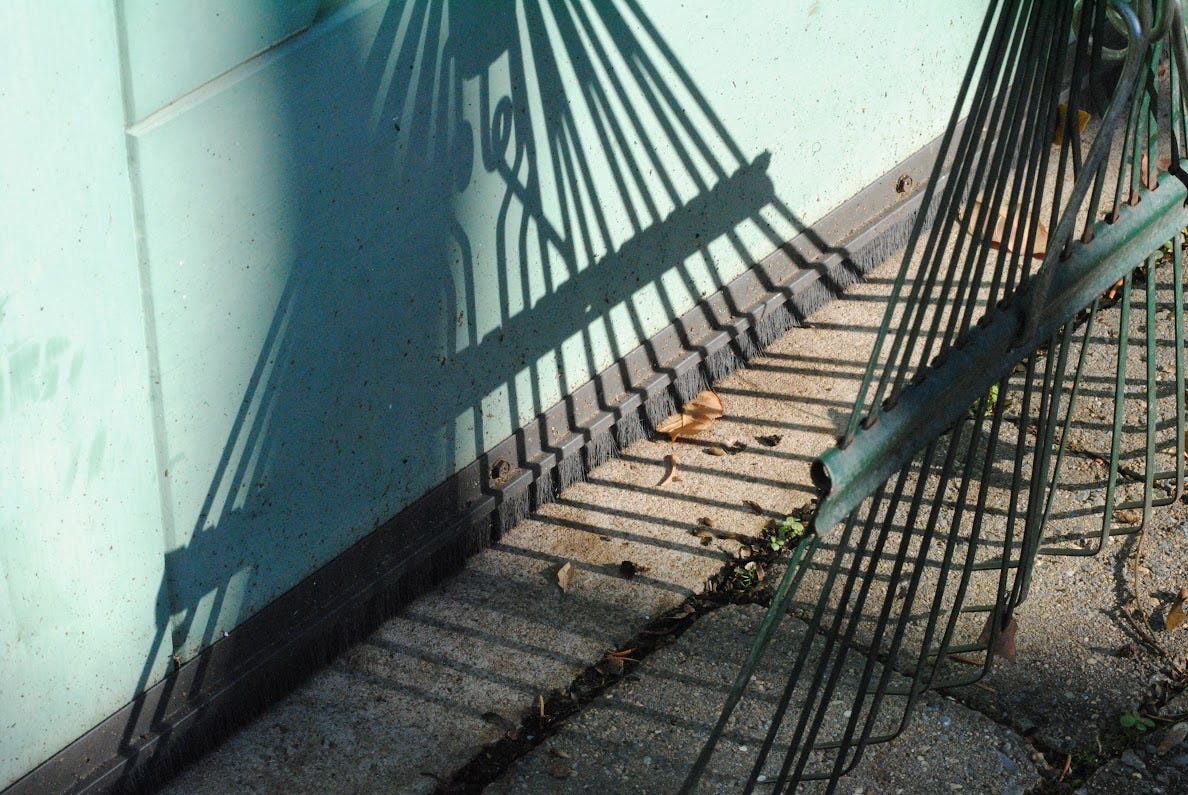Problem With That Leaf Blower
If you're reading this on a fall day, there's a good chance the soundtrack to your scrolling includes the droning of neighborhood leaf blowers. They've become a fixture of the season. While embracing their convenience, though, we've lost sight of the health and environmental threats they pose.
Turns out, our quest to create bare-naked, leaf-free yards with machines that force air through nozzles at high speeds creates tremendous air and noise pollution. Maybe it's time we rethink our goals and tools?
Most gas-powered leaf blowers are exceptionally dirty and inefficient compared to other modern engines. They spew out as much as a third of their gas and oil as unburned aerosol. They also release formaldehyde, benzine, and other particulates and chemicals that can cause dizziness, headaches, asthma attacks, heart and lung disease, cancer and dementia. A 2011 study found that 30 minutes of using a leaf blower in the yard can emit the same amount of hydrocarbons as driving a pickup truck from Texas to Alaska. In addition, they kick up clouds of pollutants and irritants from the ground, such as fertilizers, herbicides and pesticides, dried animal feces, dust, pollen, mold and heavy metals. Who wants to be breathing that?

They’re also loud as hell. For context, rustling leaves clock in at 20 to 30 decibels and a wailing siren will hit 120 to 140. The World Health Organization considers sounds above 55 decibels harmful. Those above 85 can cause permanent hearing damage in humans. Gas-powered leaf blowers typically run at 80 to 90 decibels or higher. We're well into harmful/damaging territory there. In addition to their decibel level, they produce a low-frequency sound that cuts through windows, doors, walls, even cement barriers. This means they have a far broader impact than other noises at the same decibel levels. In addition to hearing loss, exposure to loud noise can cause high blood pressure, heart disease, sleep disturbances and stress. Who wants to be subjecting their ears and mental health to that?

What’s harmful to humans is also bad for wildlife. Animals use sound for a variety of survival functions, including to navigate, survey surroundings, find food, attract mates, and dodge predators. Noise pollution disrupts these critical tasks. A study of three bird species showed noise pollution causing increased anxiety, distraction and hypervigilance. Constant noise could be acting as an “acoustic blanket,” muffling the audio cues birds rely on to detect predators, competitors and their own species. Unable to discern whether their environment is safe, parent birds must choose, for example, between staying on guard at the nest and finding food for their young. Who wants to inflict that on our feathered friends?

More than 100 jurisdictions – Washington, DC now among them – have banned or restricted the use of gas-powered blowers. They’ll be prohibited across all of California in 2024. This is good, if incremental, news.
But you don’t have to wait on the politicians; you can make a difference at your own home. If you must blow leaves, there are electric and battery-operated machines to choose from. These are somewhat quieter and cleaner than their gas-guzzling cousins. If you employ a mow-and-blow service, you can ask them to transition away from gas.
Better yet, there are rakes! Remember rakes? They do a heckuva job with minimal noise and zero pollution.
Even better, just leave the leaves. You’re welcome to leave them exactly where they’ve fallen. They’ll condition your soil, insulate roots, retain moisture, capture stormwater, and provide shelter and foraging grounds for innumerable moths, butterflies, bees, birds and small reptiles and mammals. If you feel you must do some tidying, clear off your lawns and hardscapes, while concentrating leaves around your trees and shrubs and on your beds. You can also use them to get a head start on new native-plant beds for next year.

Your human, animal and botanical neighbors will thank you!
And now, I’d like to dedicate this song to all the gas-powered leaf blowers out there.
Resources
Dominique Maria Bonessi, et al, “Here are the New Laws Going into Effect Jan 1 across the DC Region,” DCist, December 29, 2021.
James Fallows, “Get Off My Lawn,” The Atlantic, April 2019.
Adrian Higgins, “We Know You Love Your Leaf Blower But It’s Ruining the Neighborhood,” Washington Post, November 1, 2016.
Oliver Milman, “Tree-mendous News: Noisy Gas Powered Leaf Blowers Banned in Washington DC,” The Guardian, January 5, 2022.
Margaret Renkl, “The First Thing We’ll Do, Let’s Kill All the Leaf Blowers,” New York Times, October 25, 2021.
Natalie van Hoose, “Noise pollution causes chronic stress in birds, with health consequences for young,” Florida Museum, January 8, 2018.
“Large-scale nest study shows that noise and light pollution alter bird reproduction,” School for Environment and Sustainability, University of Michigan, November 11, 2020.
“Leaf Blower's Emissions Dirtier than High-Performance Pick-Up Truck's, Says Edmunds' InsideLine.com,” Edmunds, December 6, 2011.


